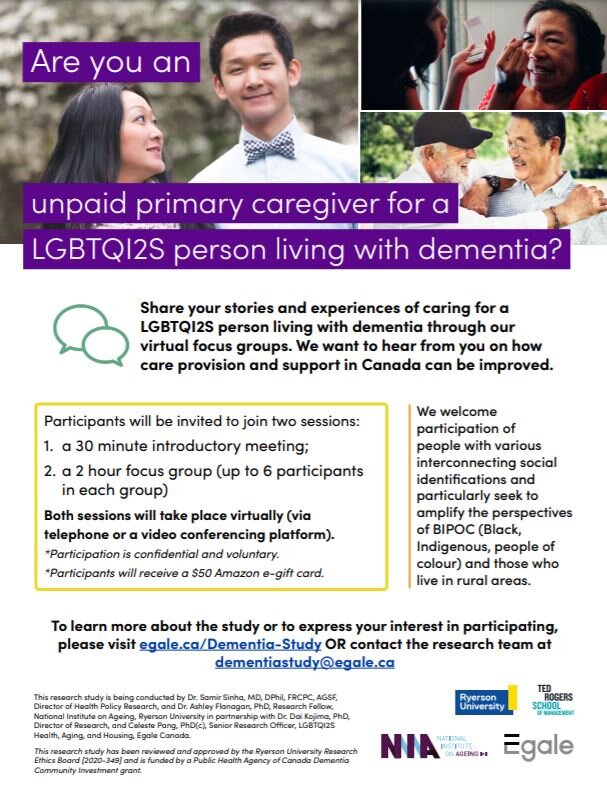From the inside out: The integration, optimization, and promotion of inclusive approaches to supporting LGBTQI2S PLWD and their unpaid primary carers
The National Institute on Ageing (NIA) and Egale Canada have teamed up for an important new national research project, funded by the Public Health Agency of Canada, to better understand the unique experiences of LGBTQI2S (lesbian, gay, bisexual, transgender, queer, intersex, Two-Spirit) persons living with dementia (PLWD) and their unpaid caregivers in Canada. Recognizing that there is a gap in current understandings of people who are living and/or caring for others at the intersections of LGBTQI2S identities and dementia, the goal of this research project is to connect to and explore individual experiences of care and support as lived by LGBTQI2S PLWD, unpaid caregivers, and/or LGBTQI2S caregivers of someone living with dementia, through a series of online focus groups.
While it is becoming more well-known that sexual and gender identity matter with respect to expectations for care and quality of life (e.g., fear of being forced back into the closet[1], maintaining identity) in old age, there is a dearth of knowledge, policy, and practices that are relevant to the lived experiences of LGBTQI2S PLWD and their unpaid caregivers—especially when it comes to the ageing experiences of transgender and non-binary people, and queer and trans Black, Indigenous, and people of colour who are living with dementia[2].
As a result, there is a clear need to recognize the unique experiences (e.g., historical experiences of systemic discrimination, loss of familial relationships) of LGBTQI2S PLWD and their unpaid caregivers, as we advocate to ensure sexual and gender rights are recognized and respected in ageing and at older ages[3].
It is our goal that the insights provided by this study will positively influence LGBTQI2S PLWD and their unpaid caregivers’ experiences of care and support within communities across Canada. In particular, the results of this research will be used to help inform educational efforts and awareness campaigns, and may also inform policy decisions and programming options.
The research team consists of Dr. Samir Sinha, MD, DPhil, FRCPC, AGSF, Director of Health Policy Research, and Dr. Ashley Flanagan, PhD, Research Fellow, National Institute on Ageing, Ryerson University in partnership with Dr. Dai Kojima, PhD, Director of Research, and Celeste Pang, PhD(c), Senior Research Officer, LGBTQI2S Health, Aging, and Housing, Egale Canada.
If you have any questions about this research study, please contact the research team at dementiastudy@egale.ca or one of the project leads:
Dr. Ashley Flanagan: akflanagan@ryerson.ca
Celeste Pang: cpang@egale.ca
This research project is funded by the Public Health Agency of Canada, which is leading the implementation of Canada’s National Dementia Strategy, and has been reviewed and approved by the Ryerson University Research Ethics Board (REB 2020-349).
For more information, to sign up for the study, please visit our project website: https://egale.ca/dementia-study/.
Ashley Flanagan is a Research Fellow at the National Institute on Ageing. She completed her PhD in Ageing, Health, and Wellbeing at the University of Waterloo, where her research focused on 2SLGBTQIA+ ageing and old age with the goal of advancing comprehensive health and wellness policy, programs, and services for older adults with diverse gender and sexual identities. Ashley is also a member of the Ontario Centre for Learning, Research and Innovation in Long-term Care’s (CLRI) Supporting Diversity & Inclusion in Long-Term Care Advisory Group.
[1] “The closet” refers to, according to Wilson, Kortes-Miller, & Stinchcombe (2018), “…being hidden for individuals who identify as LGBT. Being in the closet is an expression that is connected to a lack of disclosure of sexual orientation or gender identity, including aspects of sexual identity and sexual behaviour. Being forced back into the closet represents a fear of loss of autonomy, identity, and freedom of sexual expression. Participants expressed fear that they were at risk of being coerced back into the closet towards the end of their lives in order to feel safe during a period in which they anticipated being vulnerable and lacking in power” (p. 28).
[2] Babulal et al., 2020; Barrett, Crameri, Lambourne, Latham, & Whyte, 2015; Correro & Nielson, 2020; Moreno, Laoch, & Zasler, 2017; Peel, Taylor, & Harding, 2016; Wilson, Stinchcombe, Ismail, Kortes-Miller, 2019.
[3] Baril & Silverman, 2019; Barrett, Crameri, Lambourne, Latham, & Whyte, 2015; Flatt, Johnson, Karpiak, Seidel, Larson, & Brennan-Ing, 2018.

